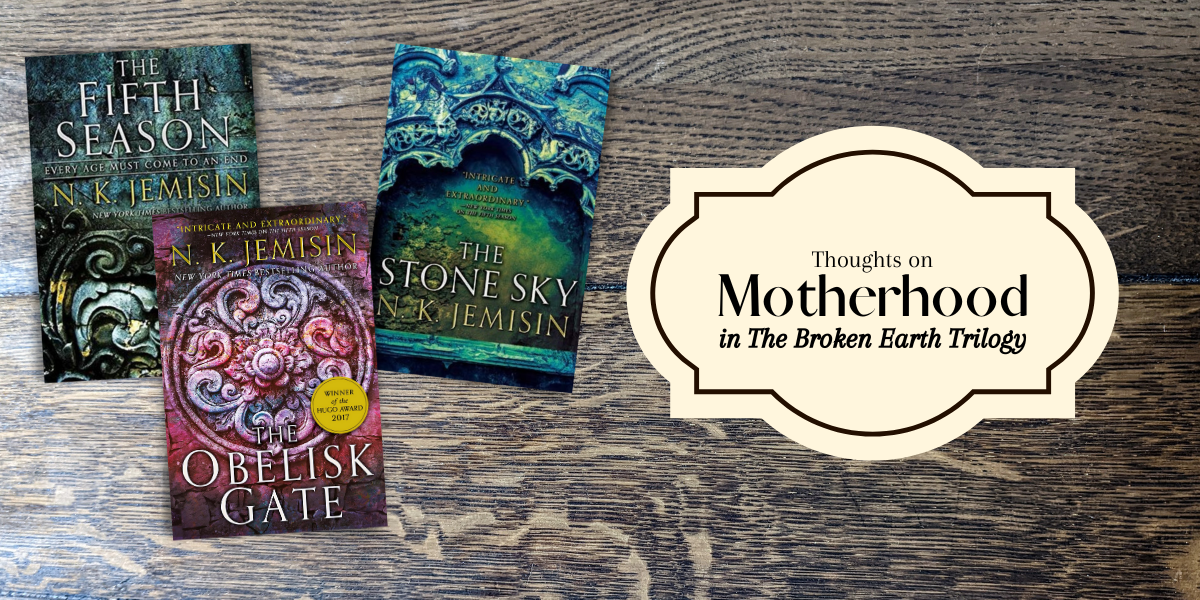Our perception of motherhood in The Broken Earth trilogy is challenged by the story of Sanza especially in The Fifth Season, but it is continued theme throughout the series. The books are amazing reads and challenging reads. Here I will look at the role of motherhood in the first two books of The Broken Earth Series. Strong content warnings for child abuse, slavery and infanticides.
This post will contain spoilers for the first two books in the series – and they will be deep spoilers. So do not read on, if you do not want to get spoiled for the books. If you just want my review of The Fifth Season.
Part of what the books discuss is what it means to give birth to children in a deeply oppressive society – in a society, that will treat your children as subhuman, as a part of an enslaved underclass – the powerful orogenes, who have the power to quell earthquakes and shape the earth.
The protagonist Sanza was abused as a child into being complaint with the system and she has learned – internalized – that she most never disobey the system. The system that force the orogenes to not only obey, but to be polite about it, to be as unthreatening as possible at all times and to see them self as useful monsters. Sanza internalize the system to a point where she want to advance in the system – because that is the only way to get a degree of freedom and to get a few privileges. The story is very much a slave story. The way the system subvert the slaves’ desires and force them into complacency is so reminiscence of the way especially the house slaves were treated in the United States in centuries past. Knowing Jemisin – these are very deliberate parallels.
The two enslaved orogenes Sanza and Alabaster are forced to have sex, with the explicit purpose of getting Sanza pregnant. None of them wants it. Sanza do get pregnant. During her pregnancy they both escape to an island, that lets them be free.
At the island Sanza struggles with being a mother, with the expectation of the men in her life, that being a mother should take up all of her ambition in life. That it should fill her life so completely that she doesn’t want to be anywhere than with her child. Sanza want to be useful to society at large – she wants to work, as she always have. The idea of staying home all day taking care of her son is almost claustrophobic to her. Alabaster even calls her a bad mother for feeling that way.
They are recaptured and Sanza decides to kill their child rather than let him be captured into the abusive system once again. Another parallel to the choice some slaves throughout history choose.
Later in life, as a free woman, Sanza has chosen to have two children with a man, who never knew that she was an orogene. She loves her children, but she has no model for how to be a kind and loving mother. Her own mother gave her to the slave system, when Sanza powers manifested. She was abused by her father figure – her guardian. So to me it was not surprising, but disheartening, when she repeat his abuses with her own children. The guardian always told her that he abused her for her own sake and for the sake of the world, because she couldn’t be trusted without the abuse. Her oldest daughter is very powerful and resend her mother’s harsh lessons, so she push back, and Sanza punish her, as she was punished when disobedient. Sanza test her control in the same way.
But Sanza loves all her children. She is deeply depressed after she has killed her first child. She falls into a catatonic state when her second son is killed by his own father – upon learning that the child is an orogene. Her motivation from there on out is to get her daughter back from the father, who has taken her away.
Sanza has had terrible rolemodels and she does continue the circle of abuse, that she has learned and internalized in a deeply abusive system.
It is powerful and amazing (in a horrible way) to see a female protagonist who is allowed to be this deeply flawed. That she doesn’t raise above the abuse, that she doesn’t break the circle of violence – and she is still the protagonist that we as the reader want to succeed. What is even more amazing, is to see a book, with a deeply flawed female protagonist get this much acclaim. The first won the Hugo for best novel last year, the second one is nominated for a Hugo as well as for a Nebula award. And people love the books.
Edit: All of the books did indeed win Hugo award from best novel.
So often we hear that readers do not like flawed female protagonists – that they are less forgiving of them. But Jemisin lets her protagonist have the biggest flaw a female can have in our society – she is not a good mother – she is even a very bad one at times. However Jemisin lets us understand Sanza’s background, she lets us see why she is flawed, lets us see her as human. So we do not hate Sanza for her flaws, because we understand them.
This ended up being a longer blog post than I thought it would be. Let me know what you thought about Sanza as a mother.
This review was originally posted: June 26, 2017, Updated June 24, 2023


Leave a Reply